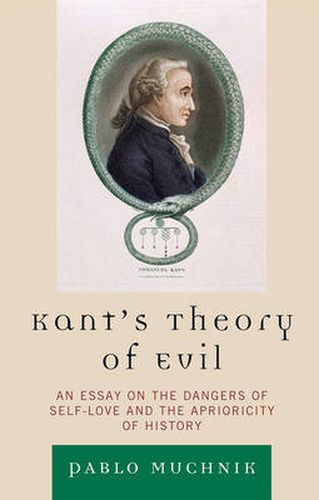Readings Newsletter
Become a Readings Member to make your shopping experience even easier.
Sign in or sign up for free!
You’re not far away from qualifying for FREE standard shipping within Australia
You’ve qualified for FREE standard shipping within Australia
The cart is loading…






Kant’s Theory of Evil: An Essay on The Dangers of Self-Love and the Aprioricity of History presents a novel interpretation and defense of Kant’s theory of evil. Pablo Muchnik argues that this theory stems from Kant’s attempt to reconcile two parallel lines of thought in his own writings: on the one hand, a philosophy of history of Rousseauian inspiration and naturalistic tendencies; on the other, the metaphysical project of founding morality exclusively on a priori grounds. The syncretism of Kant’s view, as exemplified by the resulting moral anthropology in Religion within the Limits of Mere Reason, explains its persistent allure and elusiveness among Kantian readers. Muchnik’s reconstruction solves some of the most intractable problems surrounding Kant’s position, and is designed to break the deadlock existing between contemporary rival schools of interpretation, torn between Kant’s naturalistic tendencies and his moral individualism. The quasi-transcendental conceptual apparatus presented in these pages will open up new paths of investigation in Kant, and influence the way we approach the problem of evil in general.
$9.00 standard shipping within Australia
FREE standard shipping within Australia for orders over $100.00
Express & International shipping calculated at checkout
Kant’s Theory of Evil: An Essay on The Dangers of Self-Love and the Aprioricity of History presents a novel interpretation and defense of Kant’s theory of evil. Pablo Muchnik argues that this theory stems from Kant’s attempt to reconcile two parallel lines of thought in his own writings: on the one hand, a philosophy of history of Rousseauian inspiration and naturalistic tendencies; on the other, the metaphysical project of founding morality exclusively on a priori grounds. The syncretism of Kant’s view, as exemplified by the resulting moral anthropology in Religion within the Limits of Mere Reason, explains its persistent allure and elusiveness among Kantian readers. Muchnik’s reconstruction solves some of the most intractable problems surrounding Kant’s position, and is designed to break the deadlock existing between contemporary rival schools of interpretation, torn between Kant’s naturalistic tendencies and his moral individualism. The quasi-transcendental conceptual apparatus presented in these pages will open up new paths of investigation in Kant, and influence the way we approach the problem of evil in general.